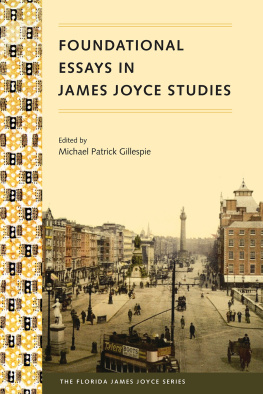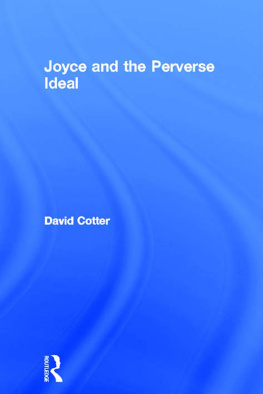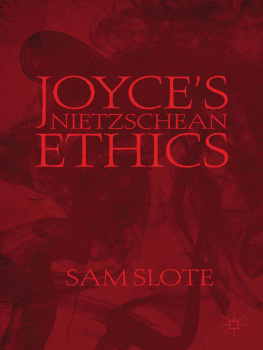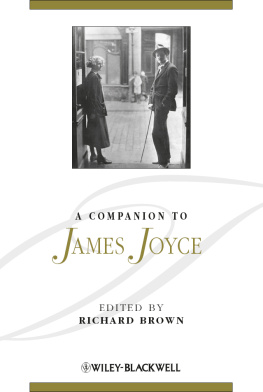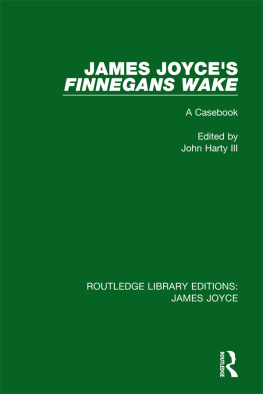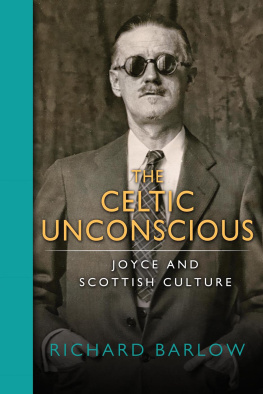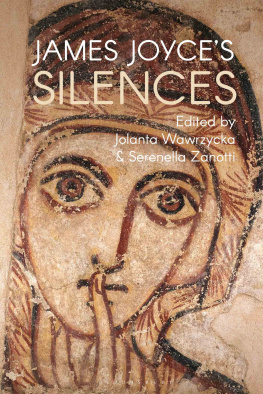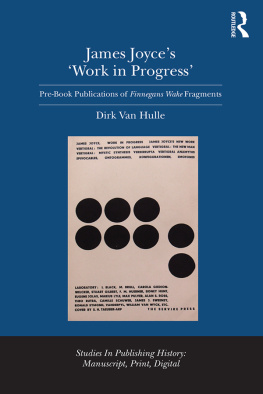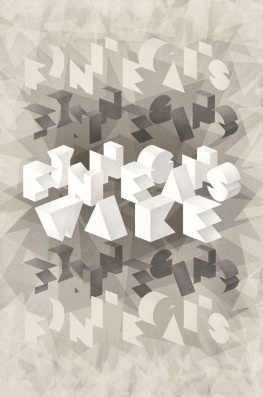
Foundational Essays in James Joyce Studies
THE FLORIDA JAMES JOYCE SERIES

UNIVERSITY PRESS OF FLORIDA
Florida A&M University, Tallahassee
Florida Atlantic University, Boca Raton
Florida Gulf Coast University, Ft. Myers
Florida International University, Miami
Florida State University, Tallahassee
New College of Florida, Sarasota
University of Central Florida, Orlando
University of Florida, Gainesville
University of North Florida, Jacksonville
University of South Florida, Tampa
University of West Florida, Pensacola
FOUNDATIONAL ESSAYS IN JAMES JOYCE STUDIES
EDITED BY
MICHAEL PATRICK GILLESPIE
Foreword by Sebastian D. G. Knowles, series editor
University Press of Florida
Gainesville Tallahassee Tampa Boca Raton
Pensacola Orlando Miami Jacksonville Ft. Myers Sarasota
Copyright 2011 by Michael Patrick Gillespie
All rights reserved
Printed in the United States of America on acid-free paper
22 21 20 19 18 17 6 5 4 3 2 1
First cloth printing, 2011
First paperback printing, 2017
A record of cataloging-in-publication data is available from the Library of Congress.
ISBN 978-0-8130-3529-1 (cloth)
ISBN 978-0-8130-5482-7 (pbk.)
The University Press of Florida is the scholarly publishing agency for the State University System of Florida, comprising Florida A&M University, Florida Atlantic University, Florida Gulf Coast University, Florida International University, Florida State University, New College of Florida, University of Central Florida, University of Florida, University of North Florida, University of South Florida, and University of West Florida.
University Press of Florida 15 Northwest 15th Street Gainesville, FL 32611-2079 http://upress.ufl.edu | 
|
To A. Nicholas Fargnoli
a fine teacher, an excellent scholar,
and a superb friend
Contents
Florence L. Walzl (1965)
Thomas F. Staley (1966)
Robert Scholes (1979)
James R. Thrane (1960)
S. L. Goldberg (1961)
Thomas F. Van Laan (1964)
A. Walton Litz (1956)
Edmund L. Epstein (1957)
Marvin Magalaner (1953)
David Hayman (1958)
Clive Hart (1960)
Robert Boyle, S.J. (1966)
Foreword
If I want to read some good Joyce essays, where should I start? I wish I had a florin for every time Ive been asked this question: students badly need a sense of the history of Joyce studies, and there is nothing currently available as comprehensive in its outlook as the present anthology. Not only is Gillespies book a valuable guide to the best that has been thought and said in Joycean culture, its taxonomies divide the field in such a way that the book becomes a gate of entry to many different ways of reading and thinking about Joyce. Most Joyceans (myself included) affect a spectacular indifference to earlier scholarship, and I suspect that only a handful of these essays are discussed with any regularity by even the most assiduous researchers. By reintroducing these seminal essays to the light of day, Michael Patrick Gillespie performs a critical service to the Joyce community, and reminds us all that we are standing on the shoulders of giants.
The goal of restoring scholarly memory is a vital and necessary one. One is always struck by the role that personal memory plays in Joyces characters, and in the whole modernist project, which amounts to a reclamation of the past, from the childs drawings in Blooms desk drawer in Ithaca to Minta Doyles grandmothers brooch in To the Lighthouse to the columns of St. Magnus the Martyr (Inexplicable splendour of Ionian white and gold) in The Waste Land. These objects have a four-dimensional space, the fourth dimension, as Proust says, being time. In the same way, the articles here, from David Haymans essay on one sentence in Book III of Finnegans Wake to S. L. Goldbergs reading of detachment and the dramatic art in Stephen Hero, are richly encrusted with the work of the literary generations that followed them. The dead writers are remote from us because we know so much more than they did, says an anonymous voice in Tradition and the Individual Talent, to which Eliot provides the resounding rejoinder: Precisely, and they are that which we know. Many of these writers in Foundational Essays in James Joyce Studies are very much alive, but to all but specialists in the particular fields their work has been largely forgotten. Michael Patrick Gillespie has brought these essays back for us to measure more accurately the distance that we have traveled, and how much further we have still to go.
Sebastian D. G. Knowles
Series Editor
Acknowledgments
I am very grateful to a number of individuals whose advice, encouragement, and enthusiasm greatly enhanced this project. I would like in particular to acknowledge the help of the following.
Joyce Community: Derek Attridge, Murray Beja, Lucia Boldrini, Sheldon Brivic, Vincent Cheng, Kevin Dettmar, Edmund Epstein, A. Nicholas Fargnoli, Kate Flint, Andrew Gibson, Amy Gorelick, Michael Groden, Clive Hart, Cheryl Herr, Phillip Herring, Carol Kealiher, Sebastian Knowles, Sean Latham, Vicki Mahaffey, Patrick McCarthy, Patrick McGee, Timothy Martin, Michael Molino, Ira Nadel, Christine ONeill, Barry Qualls, John Paul Riquelme, James Silas Rogers, Fritz Senn, Sam Slote, Robert Spoo, Thomas Staley, Erwin Steinberg, Weldon Thornton, Joseph Valente, Robert Wininger.
At Marquette University: Jarrold Hurlburd, Tim Machan, Krista Ratcliffe, Albert Rivero, Abby Vande Walle.
At Florida International University: Philip Marcus, Asher Milbauer, James Sutton.
At the University Press of Florida: Michele Fiyak-Burkley, Amy Gorelick, Sebastian Knowles, Ann Marlowe.
I am grateful for permission to reprint the articles appearing in this volume.
Introduction
A Retrospective Arrangement
Professors of English thrive on invoking, often haphazardly, their literary antecedents. Most of us can hardly get through conversations with colleagues and certainly cannot conduct classes without injecting apocryphal biographical anecdotes, garbled fragments of obscure poems, and knowing allusions to works of justifiably ignored authors. While for a few academics these tidbits represent the summation of their contact with the canon, for most of us this is simply an idiosyncratic indulgence. We in fact do take the trouble to read and reread the primary works in our field and make an effort to keep abreast of current critical debates.
I also believe that a majority of us deeply esteem the critical studies of the scholars whose ideas shaped our notions of the methods and concepts necessary for responding to the literature to which we have dedicated our lives. However, despite our best intentions to remain engaged with the foundational views that informed our own sensibilities, conflicting demands often overwhelm us. Our field is dominated by assimilation and progression. We work in a profession that demands familiarity with the most current theories and pushes for the continual production of new ideas. These imperatives inevitably privilege the most recent views and methods over long-established approaches. Academic expectations also pressure us to produce within highly specific areas of interest at a pace that makes it difficult for even the most conscientious scholars to follow all of the other developments in the field we claim as our specialty.
Next page
